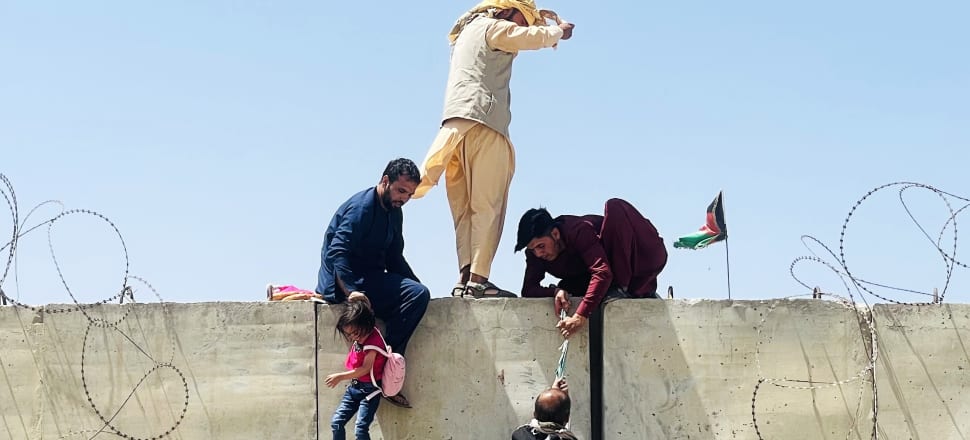
‘Let these young people have a life’ is the plea from a lawyer for an Afghan teenager living without her parents in New Zealand. She's one of a dozen children who fled here when the Taliban took over who are now forcibly separated from their families.
It's not difficult to tug on the heartstrings when you tell immigration stories of families split up by the traumas of war, but this story about children living without their parents on the other side of the world is especially agonising.
And we may never have known about the 20 Afghan children who came to New Zealand without their mothers and fathers if it was not uncovered by Corazon Miller on 1News.
She focuses on teenager Arezo Nazari, who fled Afghanistan two years ago along with hundreds of thousands of Afghans escaping the Taliban.
Now 18 and planning to study law at university in New Zealand, Arezo is still trying to persuade authorities to let her parents and brother join her here.
Her lawyer, Claudia Elliott, says it is wrong that Arezo has not been supported by Immigration New Zealand or the associate immigration minister who has discretion to intervene and allow her family into the country.

"Let's not blame the young people who have had the guts to get here and live here, let's not punish them any more than we already have, and let's let them bring their parents and their siblings in," says Elliott.
She was appointed by the Family Court to be Arezo's lawyer soon after the 16-year-old arrived and Oranga Tamariki took charge of her and the other unaccompanied children. Arezo has lived in a foster home, and is now in her final year of high school with plans to study law next year.
Elliott, who has worked for the United Nations in Somalia and Afghanistan, was well aware of the circumstances Arezo was in when she fled Kabul after being separated from her family.
"It was total chaos. There were bomb threats, there were all sorts of things going on. So I think the military, whoever it was from New Zealand, made a very principled decision to let these young people through," she says.
But so far Immigration New Zealand and "three different ministers" have declined to allow Arezo's parents and brother to join her.
"No reasons given, and where there were reasons given they were inaccurate and frankly, plainly wrong, such as that they worried that Arezo was a trafficked child," says Elliott.
According to Miller's reporting, Immigration New Zealand says despite concerns it has never concluded that Arezo was trafficked or used as a child anchor. But documents obtained by 1News show that INZ officials wrote of a risk that allowing the parents of one individual in may set a precedent for other unaccompanied minors.
From her own experience of working with trafficked women and children in Somalia, Elliott is adamant that Arezo is "not a trafficked child".

"I have sat through three interviews, one of over four hours with Arezo. I've been a litigator for 40 years. I can tell when people are pulling the wool, and Arezo isn't," Elliott tells The Detail.
She dismisses authorities' precedent-setting concerns, arguing that there are only a few children seeking to have their parents join them.
"Let's get on with it and have a heart and let these young people have a life which will mean they'll flourish."
The Detail also talks to former UN lawyer and Green MP Golriz Ghahraman, who came to New Zealand with her family as a child asylum seeker.
She says Immigration New Zealand's response is close to Australia's hard line on asylum seekers, and very different to that of the European Union when the war in Ukraine displaced millions of people.
"It is incredible that different institutions [such as Oranga Tamariki] have come together and cared for them. But really it's been Immigration that's been that bar to that final step of prioritising the interests of a child – which is another obligation that New Zealand actually signed up to.
"There's been one institution here that's weighed up its own interests against the rights and interests of these children and come down on the other side of that, but so many others have taken care of them for these years," Ghahraman says.
The office of associate immigration minister Rachel Brooking says it receives thousands of letters and requests relating to individual cases.
Though not commenting on the specifics of any case, it says for decisions to be considered for review by the minister, the requestor needs to have exhausted all other avenues.
But Ghahraman says this process could take years, and Claudia Elliott says Brooking's intervention is the only option for Arezo.
"For goodness sake – if you're the only minister in the whole of the ministers who has that discretion, it's there for a reason. Use it for a good cause, and Arezo is an excellent cause."
Check out how to listen to and follow The Detail here.
You can also stay up-to-date by liking us on Facebook or following us on Twitter.








